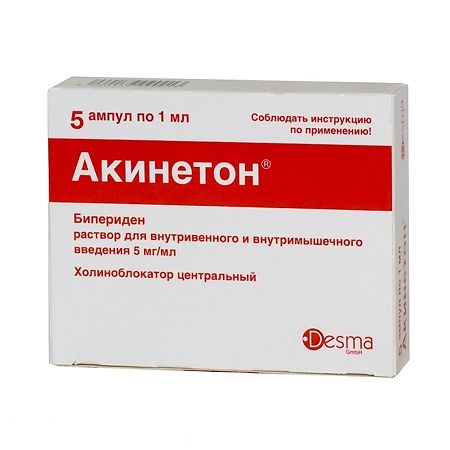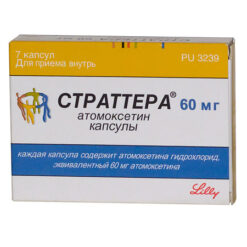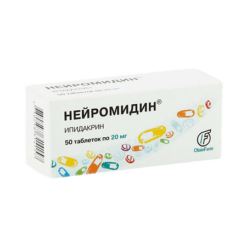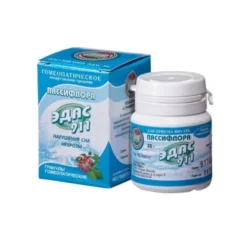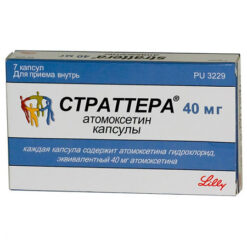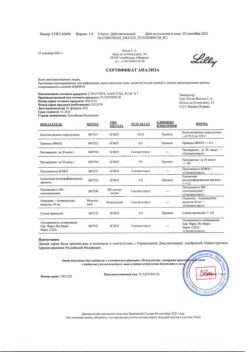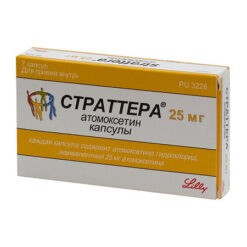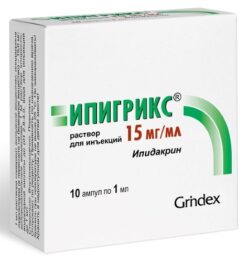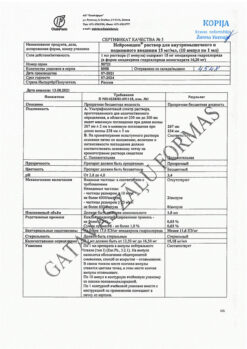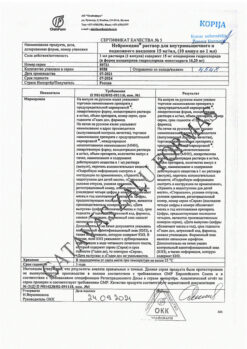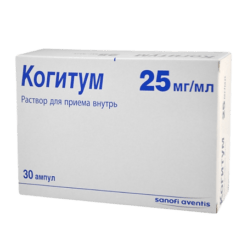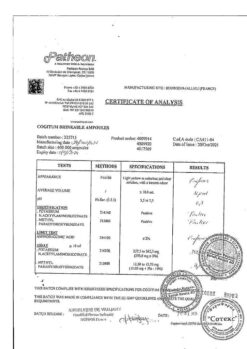No products in the cart.
Akineton 5 mg/ml 1 ml, 5 pcs.
€6.40 €5.55
Description
Pharmacotherapeutic group: Central N-cholinoblocker < br> < br> Pharmacological action
Anticholinergic drug of central action, reduces the activity of cholinergic neurons of striatum (structural component of extrapyramidal system). Peripheral anticholinergic action is expressed to a lesser extent. It reduces tremor and rigidity. Biperiden causes psychomotor agitation and autonomic disturbances.
Pharmacokinetics
Distribution
The binding to plasma proteins is 91-94%. Plasma clearance is 11.6±0.8 ml/min/kg. It is excreted with breast milk.
Metabolism
Biperiden is completely metabolized. The major metabolites are bicycloheptane and piperidine.
Elimation
It is excreted as metabolites in the urine and feces. Excretion occurs in two phases. T< sub>1/2 of the first phase is 1.5 h, T< sub>1/2 of the second phase is 24 h.
Pharmacokinetics in special clinical cases
The T< sub>1/2 may be increased in elderly patients.
< br> < br> < br> < br>
Indications
Indications
Active ingredient
Active ingredient
Composition
Composition
How to take, the dosage
How to take, the dosage
In severe cases of Parkinsonism syndrome in adults, the drug is administered in a slow dosage of 10-20 mg (2-4 ml) per month, divided into 2-4 injections.
In case of medication-induced movement disorders, in order to achieve a rapid therapeutic response, the drug is administered in adults in a slow dosage of 2.5-5 mg (0.5-1 ml) once in the body or intravenously. If necessary, the same dose may be administered again after 30 minutes. The maximum daily dose is 10-20 mg (2-4 ml).
In children under 1 year of age, the drug is administered slowly by IV in a dose of 1 mg (0.2 ml), under 6 years of age 2 mg (0.4 ml), and under 10 years of age 3 mg (0.6 ml). If necessary, this dose can be administered again after 30 minutes. The drug should be discontinued if side effects develop during administration.
Aquineton® has limited experience with drug dystonia in children with short courses of treatment with the drug.
In nicotine poisoning in adults, in addition to standard therapy, the drug is administered in a dose of 5-10 mg (1-2 ml) in m/m and in an IV dose of 5 mg when the patient’s life is threatened.
In case of poisoning with organic phosphorus mixture individual dosing of biperiden is carried out, depending on the degree of poisoning. The drug is administered by IV in a dose of 5 mg with repeated administration until symptoms of poisoning disappear.
Interaction
Interaction
The use of Aquineton® in combination with other anticholinergic psychotropic drugs, antihistamines, antiparkinsonian and antiepileptic drugs may contribute to increased central and peripheral side effects.
Concomitant administration of quinidine may cause increased anticholinergic cardiovascular effects (especially impaired AV conduction).
Concomitant administration with levodopa may increase dyskinesia.
The anticholinergic agents may increase the central side effects of pethidine.
The depressant effect of ethanol on the CNS is increased during treatment with the drug.
Akineton® attenuates the effects of metoclopramide and similarly acting gastrointestinal agents.
Special Instructions
Special Instructions
Side effects are seen primarily in the early stages of treatment and when the dose is increased too quickly.
Unless there are life-threatening complications, abrupt withdrawal of the drug should be avoided.
Elderly patients, particularly those with cerebral disorders of a vascular or degenerative nature, may often have hypersensitivity to the drug.
The central anticholinergic drugs similar to Aquineton® may increase the susceptibility to epileptic seizures. Therefore, physicians should take this fact into account when treating patients with this predisposition.
Late dyskinesia caused by neuroleptics may be exacerbated by Akineton®.
Parkinsonian symptoms in cases of advanced tardive dyskinesia can in some cases be so severe that they prevent continuation of treatment with anticholinergic medications.
Akineton® abuse has been noted. This phenomenon may be related to mood enhancement and temporary euphoric effects of this medication, which are occasionally observed.
In prolonged therapy with Akyneton®, intraocular pressure should be checked regularly.
Impact on driving and operating machinery
Administration of Akyneton®, especially in combination with other centrally acting drugs, anticholinergic agents, may impair the ability to drive and operate machinery.
Contraindications
Contraindications
With caution, the drug should be prescribed in cases of prostatic hyperplasia, urinary retention, heart rhythm disorders, elderly patients (especially in the presence of organic brain symptomatology) and patients who are prone to epileptic seizures.
Side effects
Side effects
CNS disorders: dizziness, drowsiness, weakness, increased fatigability, anxiety, confusion, euphoria, memory disturbance and in some cases hallucinations, delirium disorders; nervousness, headache, insomnia, dyskinesia, ataxia, muscle cramps and speech disorders. In cases of increased nervous system agitation, especially in patients with cerebral dysfunction, the drug dose should be reduced.
Digestive system disorders: dry mouth, increased salivary glands, constipation, epigastric discomfort, nausea.
VIight: accommodation paresis, mydriasis accompanied by photophobia, closed-angle glaucoma (intraocular pressure should be monitored regularly).
Cardiovascular system disorders: tachycardia and bradycardia, decreased blood pressure.
Urinary system disorders: difficulty in urination, especially in patients with prostatic hyperplasia (in this case it is recommended to reduce the dose); more rarely – urinary retention.
Others: decreased sweating, allergic reactions, drug dependence.
Overdose
Overdose
Symptoms: dilated, slowly reactive pupils (mydriasis), dry mucous membranes, flushed skin, rapid heart rate, bladder and bowel atony, hyperthermia, especially in children, agitation, confusion, delirium, collapse.
Treatment: antidote – acetylcholinesterase inhibitors and primarily physostigmine, if necessary – bladder catheterization. Carrying out symptomatic therapy.
Pregnancy use
Pregnancy use
Because there is limited experience with Akineton® in pregnancy, the drug should be administered after careful evaluation of the potential benefit to the mother and the possible risk to the fetus, especially in the first trimester.
Biperiden is excreted with breast milk, in which its concentrations may reach concentrations seen in plasma, so breastfeeding should be discontinued during treatment.
Similarities
Similarities
Additional information
| Shelf life | 5 years |
|---|---|
| Conditions of storage | List A. The drug should be kept out of reach of children at a temperature not exceeding 25°C. |
| Manufacturer | Sirton Pharmaceutical S.p.A., Italy |
| Medication form | solution for injections and infusions |
| Brand | Sirton Pharmaceutical S.p.A. |
Related products
Buy Akineton 5 mg/ml 1 ml, 5 pcs. with delivery to USA, UK, Europe and over 120 other countries.

